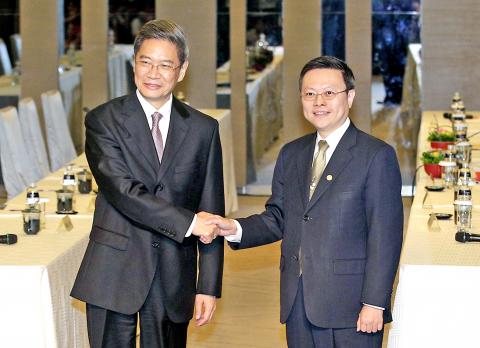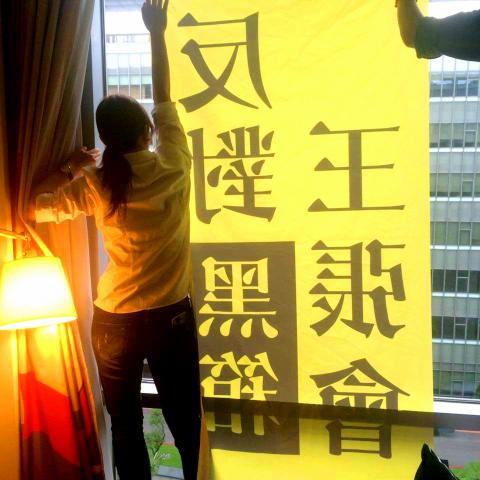China’s top Taiwan policymaker yesterday said it was important that Beijing and Taipei address issues to “consolidate the political foundation” for the continued peaceful development of relations across the Taiwan Strait.
“The cross-strait relationship has entered a new era over the years based on the [so-called] ‘1992 consensus’... Despite recent twists and turns, both sides should be committed to developing and further consolidating the political foundation” to continue to promote cross-strait exchanges in various fields, China’s Taiwan Affairs Office (TAO) Minister Zhang Zhijun (張志軍) was quoted as saying on the first day of his visit to Taiwan.
TAO spokesperson Ma Xiao-guang (馬曉光) conveyed the remarks at a press conference following Zhang’s two-hour closed-door meeting with Mainland Affairs Council (MAC) Minister Wang Yu-chi (王郁琦).

Photo: Pichi Chuang, Reuters
In Zhang’s opening remarks to the press, he said that China and Taiwan have to “increase mutual political trust” so that they can proceed in the right path to promoting the peaceful development of cross-strait relations.
The “1992 consensus” refers to a supposed understanding reached in 1992 between Taiwanese and Chinese representatives, under which both sides acknowledge that there is “one China,” with each side having its own interpretation of what “one China” means.
Zhang’s statements appear to contain a bid for political talks with Taiwan, but at a separate press conference where Wang fielded questions from reporters, the MAC minister denied that Zhang brought up political issues during the meeting.

Screengrab from the Black Island Youth Alliance Facebook page
Zhang’s trip follows a visit by Wang to China in February. That was part of efforts on both sides to establish a system of regular visits by officials and normalize communication channels between the TAO and the MAC.
The reciprocal visit by Zhang was an “important step” toward building government-to-government contact to deal with cross-strait issues, Wang and Zhang said, adding that the two sides would continue to arrange similar visits.
In Wang’s opening remarks, he said he hoped Zhang could experience Taiwan’s energetic and diverse society during his stay. He also urged Zhang and his delegation to “listen to Taiwanese people, understand their lifestyle and respect their decisions.”
At the post-meeting press conference, Wang said he reiterated during the meeting the government’s position that “the future of Taiwan has to be decided by its 23 million people per the Constitution of the Republic of China.”
Wang said he told Zhang that the government’s position is a “consensus” of Taiwanese society and hoped that Beijing would respect it.
Wang was responding to a recent comment made by TAO spokesperson Fan Liqing (范麗青), who said that the future of Taiwan should be decided by all Chinese, including people in Taiwan.
Fan’s remarks sparked a furious response from many Taiwanese. Asked whether Zhang has noticed these reactions, Ma said China’s position on issues related to its territorial integrity is clear, consistent and firm.
Wang added that Zhang agreed to two demands that Taiwan has long made: After Taiwan and China establish reciprocal representative offices across the Strait, the offices should be endowed with the right to visit prisoners detained or jailed on the other side and China should allow its tourists to transit through Taiwan en route to other countries.
On economic issues, Zhang agreed that both sides should start negotiations on the cross-strait service trade agreement in accordance with its emergency negotiation mechanism once the trade pact is passed by the legislature, continue negotiations on trade in goods and begin a study on issues related to regional economic integration.
Wang and Zhang said they did not discuss issues related to possible meetings between President Ma Ying-jeou (馬英九) and Chinese President Xi Jinping (習近平).

CHAOS: Iranians took to the streets playing celebratory music after reports of Khamenei’s death on Saturday, while mourners also gathered in Tehran yesterday Iranian Supreme Leader Ayatollah Ali Khamenei was killed in a major attack on Iran launched by Israel and the US, throwing the future of the Islamic republic into doubt and raising the risk of regional instability. Iranian state television and the state-run IRNA news agency announced the 86-year-old’s death early yesterday. US President Donald Trump said it gave Iranians their “greatest chance” to “take back” their country. The announcements came after a joint US and Israeli aerial bombardment that targeted Iranian military and governmental sites. Trump said the “heavy and pinpoint bombing” would continue through the week or as long

TRUST: The KMT said it respected the US’ timing and considerations, and hoped it would continue to honor its commitments to helping Taiwan bolster its defenses and deterrence US President Donald Trump is delaying a multibillion-dollar arms sale to Taiwan to ensure his visit to Beijing is successful, a New York Times report said. The weapons sales package has stalled in the US Department of State, the report said, citing US officials it did not identify. The White House has told agencies not to push forward ahead of Trump’s meeting with Chinese President Xi Jinping (習近平), it said. The two last month held a phone call to discuss trade and geopolitical flashpoints ahead of the summit. Xi raised the Taiwan issue and urged the US to handle arms sales to

State-run CPC Corp, Taiwan (CPC, 台灣中油) yesterday said that it had confirmed on Saturday night with its liquefied natural gas (LNG) and crude oil suppliers that shipments are proceeding as scheduled and that domestic supplies remain unaffected. The CPC yesterday announced the gasoline and diesel prices will rise by NT$0.2 and NT$0.4 per liter, respectively, starting Monday, citing Middle East tensions and blizzards in the eastern United States. CPC also iterated it has been reducing the proportion of crude oil imports from the Middle East and diversifying its supply sources in the past few years in response to geopolitical risks, expanding

Pro-democracy media tycoon Jimmy Lai’s (黎智英) fraud conviction and prison sentence were yesterday overturned by a Hong Kong court, in a surprise legal decision that comes soon after Lai was jailed for 20 years on a separate national security charge. Judges Jeremy Poon (潘兆初), Anthea Pang (彭寶琴) and Derek Pang (彭偉昌) said in the judgement that they allowed the appeal from Lai, and another defendant in the case, to proceed, as a lower court judge had “erred.” “The Court of Appeal gave them leave to appeal against their conviction, allowed their appeals, quashed the convictions and set aside the sentences,” the judges